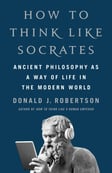Become a Creator today!Start creating today - Share your story with the world!
Start for free
00:00:00
00:00:01

Igor Grossman
Transcript
Introduction to Stoicism and Guest Igor Grossman
00:00:02
drobertson
Hello and welcome to Stoicism and Philosophy as a Way of Life. My name is Donald Robertson and today's guest is Igor Grossman, a professor of psychology and renowned researcher in the field of wisdom. Professor Grossman directs the Wisdom and Culture Lab at the University of Waterloo where he investigates the factors that contribute to wise reasoning. He's also the co-host of the On Wisdom podcast. His work has significantly advanced our understanding of how wisdom can be fostered and applied to everyday life. So hello and welcome to the podcast.
00:00:39
Igor
Hello, thank you so much for having me.
00:00:42
drobertson
It's a pleasure to speak to you. I'm fascinated by the research that you
Defining Wisdom: Subjective Nature and Cultural Influences
00:00:47
drobertson
do. um And I guess ah I just wanted to launch straight in, if you don't mind, and and ask you the but the obvious big question. What is wisdom?
00:00:59
Igor
Oh boy, that's a big one.
00:01:01
drobertson
That's a big one.
00:01:01
Igor
i And and well obviously, I mean, that's the wise thing to say.
00:01:02
drobertson
And at the deep end.
00:01:08
Igor
ah and And it really depends on the person because I think every person has some kind of an idea on intuition of what wisdom may be often sort of linked to either the people they admire or their grandma or somebody else whom they go to for advice or something else. I mean, there are a lot of different perspectives. And so what we often do in in psychology, we try to figure out if those type of lay perspectives are overlapping with some kind of philosophical and expert-driven foundations. And that's tricky. Sometimes they overlap. Sometimes they do not overlap.
00:01:49
drobertson
I wanted to say actually that I think We seldom ask ourselves explicitly what wisdom is, but I think it's actually a pretty good question. I ask my daughter sometimes, she's 13 years old, what she thinks wisdom is.
00:02:00
Igor
All right. What does she say?
00:02:05
drobertson
um She has to think about it a little bit. you know It takes a bit kind of coaxing to get an answer. But I find she and also some other people will sometimes articulate it in terms of knowing the difference between what's good and bad in life, like understanding what's ah and or understanding what's important. and
00:02:27
Igor
Right.
00:02:30
drobertson
So, yeah.
00:02:30
Igor
It's tricky. It's tricky. I mean, how do you figure out how to know, right?
00:02:34
drobertson
Yeah.
00:02:36
Igor
And so um the focus is, is it about what you know, or is it about how you handle ah complex situations where you have multiple ah possible solutions or multiple ways to go?
00:02:45
drobertson
Yeah.
00:02:52
Igor
And you are essentially at the crossroad. We often are at the crossroads. We have ah you know often multiple ways we can solve an issue, try to solve an issue.
00:02:59
drobertson
yeah
00:03:03
Igor
And um my gut feeling is that, and this is not you of more really of a gut feeling instead of sort of a verified claim, is that across many philosophical traditions, as well as human intuitions in various cultures, this notion of you know, how do you navigate the crossroads is, ah it's really central to the
Philosophical Perspectives on Wisdom
00:03:33
Igor
construct. I mean, it doesn't matter if you pick Stoicism, it doesn't matter if you pick Buddhism, or the other forms of philosophical inquiry. Or if you just think about, ah think really hard about sort of how do you, how do you the people that you admire, that you
00:03:52
Igor
attributes of wisdom to solve issues in their lives or what what kind of wisdom are they known for. It's often because you admire how they handled complex situations where they could do things very, very differently.
00:04:05
drobertson
yeah
00:04:08
drobertson
yeah I think we see a trace of this kind of, ah maybe there are two competing ways of understanding wisdom. and In ancient philosophy, I think the philosophers that preceded Socrates, the natural philosophers who are kind of precursors of modern scientists,
00:04:18
Igor
isn it
00:04:25
drobertson
I think they viewed wisdom more in terms of the content of their doctrines or beliefs and Socrates, I think, was one of the first people to really emphasize the idea that perhaps wisdom was more of a dynamic process.
00:04:44
Igor
Yeah, I mean, that's probably, that's probably right. I mean, you're more of an expert on this than I am. My gut feeling, sort of, if I put a cultural research I had on, is that we know relatively less about works before Socrates. I mean, we don't know much about Socrates by himself either. It was all sort of narrated by Plato and others. But if you go further back,
00:05:11
Igor
It gets murkier, right? So, I mean, we can sort of extrapolate, but that's it's hard, of course, to make ah super definite claims. But you're probably right that it was that certain period, the Platonic period, and thereafter, that had more of a focus on the howl versus the concrete ah suggestions for what you should do.
00:05:29
drobertson
I mean. Yeah.
Modern Views on Wisdom: Dynamic vs. Static
00:05:40
drobertson
So do you think the people today are more inclined to view wisdom as a dynamic process or do you think there's still a tendency for for people in the modern world to think of wisdom as a sort of collection of knowledge or
00:05:55
Igor
um That's a very good question. I think ah it depends on whom you ask. I mean, and I don't mean there's a general issue with whether it's really a modern world, if you look outside and sort of i look at the news, or it depends on where you look at the news. And you think, well, is this really that different? Are we are we really advancing? Sometimes I have my doubts. ah But ah I guess to answer your question concretely, I do think that
00:06:27
Igor
ah Both positions are prevalent, ah whether it is in decision sciences or in self-help books or in some contemplative philosophical traditions.
00:06:37
drobertson
yeah
00:06:42
Igor
For instance, in decision sciences, the most popular position or is about the ah value and limitations of so-called heuristics or rules of thumb, which are sort of generalized pieces of knowledge that you could apply many in many circumstances. Sometimes they work and many times they don't, but overall they may work because, you know, the limited and temporal resources. So if you don't have enough energy, and this is the right way to do. And so you just pursue that right way that sometimes will work.
00:07:22
Igor
most of the times will work and sometimes will not work. and And one could certainly try to attempt to think of wisdom in terms of the collection of these heuristics ah rules of thumb.
00:07:33
drobertson
Right.
00:07:34
Igor
And I mean, the many self-help books um like Decision Sciences would probably advocate for this position.
Metacognition and Wisdom
00:07:42
Igor
But at the same time, if you look deeper, you will see a whole range of suggestions for how to navigate ah various complex situations, how to sort of manage your time, how to reflect on yourself differently, um ah how to sort of like be more aware of your thought processes and where they lead you and sort of then inquire whether this is the right thing to do, whether this is the right strategy or that is the right strategy.
00:08:09
drobertson
Mhm.
00:08:18
Igor
And in many ways, this so-called metacognitive process is common.
00:08:24
drobertson
Mhm.
00:08:27
Igor
um And what's interesting is that it's it's not only common in the self-help books, but it's also ah prevalent in the classic philosophical scholarship, and it is central to the modern scientific understanding of wisdom.
00:08:27
drobertson
Mhm.
Comparing Modern and Ancient Wisdom
00:08:43
drobertson
Something you said a moment ago also prompted another question in my mind, which is, and I don't know whether you could answer this very easily or not, but do you feel like we're ah so our society is as any wiser than an ancient world?
00:09:00
drobertson
Let's say if we compare educated people today to people of ancient Greece and Rome, what's your sense of the the progress?
00:09:06
Igor
Yeah.
00:09:08
drobertson
like Are we moving forward in terms of moving forward towards with technology? Are we making progress in terms of wisdom?
00:09:13
Igor
Right. I mean, it's it's ah it's it's a hard question. And it's <unk> say intimately connected to what is our benchmark to evaluate what is
00:09:25
drobertson
Yeah.
00:09:26
Igor
What do we desire? What do we aspire to be as a society? And is our aspiration accomplished in some ways? or and and and And can we even have the perspective of on on what is about to come that we haven't accomplished yet? It's really hard to look at things from the perspective of here now on what we may not even have an understanding what could be possible.
00:09:55
Igor
So right now everybody screams democracy. Understanding of what democracy means and is obviously very, very different from understanding what democracy meant in ancient Greece, i mean who arguably invented the term.
00:10:08
Igor
ah you know They had slaves. ah Aristotle had no problems with slaves and arguably is was a you pretty important philosopher.
00:10:15
drobertson
yeah
00:10:20
Igor
and and yet they had democracy. And now, you know looking back from being aware of that, it's it's really hard to qualitatively and quantitatively evaluate progress.
00:10:37
drobertson
Yeah. Let me ask you a specific...
00:10:38
Igor
At the same time, i mean yeah but but i will I want to finish, I want to say that there are some markers, of course, along which we could say, like if you sort of the progress is about um it's about how long
00:10:41
drobertson
Yeah.
00:10:44
drobertson
yeah
00:10:52
Igor
people live on average, or how many people get killed in wars.
00:10:54
drobertson
Mhm.
00:10:59
Igor
Maybe there is some evidence that we've made some progress in this regard, but those are very narrow markers. And it's also not a given that just living longer is that would lead to what Aristotle would have described as eudaimonia.
00:11:07
drobertson
I hope.
00:11:17
drobertson
Let me throw something out that's a bit speculative, but I think it may be an interesting way of looking at things. So we typically think of our societies making progress in terms of technology and science and so on.
00:11:30
drobertson
But one area where ancient thinkers in Greece and Rome were particularly advanced, which is somewhat neglected today, I think, is in their understanding of rhetoric.
00:11:30
Igor
Mm hmm.
00:11:42
drobertson
They have surprisingly sophisticated texts about the many different ways that language can be used to influence audiences and listeners. So most educated ancient Greeks and Romans had a pretty sophisticated understanding of persuasion skills, verbal rhetoric.
00:12:00
Igor
Right.
00:12:01
drobertson
um And they see that as kind of the flip side of logic. You need to understand how language can be used to manipulate us in order the to avoid being manipulated by other people. And I wonder if that's a sense in which perhaps our ability to reason independently and avoid being duped or falling into fallacies might be less sophisticated than a typical educated weaker Roman.
00:12:35
Igor
Yeah, that's a very interesting question. I don't know how to even attempt to evaluate it properly, because we would need to have some kind of an independent benchmark of that.
00:12:44
drobertson
How would we measure it?
00:12:45
Igor
And as you pointed out, the rhetoric and the quality of the rhetoric, and if you just look, for instance, at texts that were produced thousands of years ago and compared them to texts or, I don't know, scripts from TikTok videos, I guess, but that are produced now.
00:12:47
drobertson
and
00:13:05
Igor
It's not like that those texts have meaning in their own right. I mean, they always embedded in a particular cultural understanding of a particular society.
00:13:17
Igor
And I don't want to make it completely relativist, but it makes it really, really hard to evaluate this. We don't know what kind of meta-cognitive processes get activated among the listeners and the the audience of the TikTok videos.
00:13:26
drobertson
yeah
00:13:32
Igor
It may be fairly complicated. I mean, the switching, the type of matter force that often and applied could be very complicated and sophisticated, where even my generation feels like, oh, we we are kind of not getting it.
00:13:47
Igor
ah say yeah It's too fast. um but it's But it's different.
00:13:49
drobertson
That's true.
00:13:51
Igor
right so so So that makes it tricky. um For instance, you know what you're mentioning about the complexity and sophistication also reminds me of the ah sort of a Shakespearean um era ah in the English-speaking countries, um which was also fairly sophisticated. And the you can sort of certainly lament whether we sort of lost that sophistication. The question is, what did we gain in return? And is it really just diminishing of the cognitive or metacognitive abilities or so adopting them to a different techno
00:14:30
Igor
ecological reality ah that we're facing today. Very hard to, of course, quantify because it means different things.
00:14:38
drobertson
how to quantify them.
00:14:41
drobertson
Let me ask you about an aspect of wisdom then that I think research has attempted to quantify in terms of the dynamic process, which is the relationship between abstract versus concrete thinking and and why in reasoning.
00:14:49
Igor
okay
00:14:59
drobertson
you Could you speak a little bit about the relationship between wisdom and abstract versus concrete styles of thinking?
Balancing Abstract and Concrete Thinking
00:15:07
Igor
Right. So this is very interesting because ah in many ways there is a temptation certainly among those people who are like you and me, ah maybe we're clinically inclined to sort of have some kind of clinical a background or have read some ah about some clinical work. In my case, I don't really have a clinical background, but but there's a temptation to think that, you know, if you take a big picture,
00:15:37
Igor
ah step back and focus on ah on this big picture on the abstract, that that's what would lead to ah wisdom. And I have thought like that for a very long time. I've published multiple papers on that. and ah And the idea behind it is the following one. So you you basically, ah when you are in the heat of the moment, when you are dealing with something really, really difficult, ah then you feel like you're stuck, and you're sort of immersing yourself in the in that experience.
00:16:07
Igor
um And you don't see anything outside of it. So obviously it's natural, almost trivial to say that, wait, take a step back, focus on the big picture. yeah I mean, good luck doing that in that moment, because if you're really in the heat of the moment, you probably will not be able to ah without sufficient training to really get unstuck, so to say. and But i thought I thought for a long time, you know that's ah that's certainly one way to go. And I've conducted a range of studies ah looking at that, that how sort of view ah distance yourself from the experience or try to ah instantiate some form of distancing from the self that it could promote it. And then I realized at some point that I was probably wrong in generalizing from the universal value of abstraction as ah as a as an element that will promote wisdom or sort of this kind of
00:17:05
Igor
ah richer meta-cognitive processing.
00:17:05
drobertson
Mm
00:17:07
Igor
And the reason is the following one.
00:17:09
drobertson
-hmm. Mm-hmm.
00:17:09
Igor
when ah When you think about any of the features of meta-cognition that in philosophy or in psychology are typically associated with wisdom, and we'll talk about some of them later, but just to give one example, this recognition of limits of your knowledge is also socratic wisdom, where Socrates misproclaimed to be the wisest person ah by the Oracle of Delphi. and and And then he's like, well, I'm not wise at all. Let me let me check. but over the And so he goes around and starts asking other people, how much do they know? Because he clearly claims, I don't know anything. I really don't. I have my limits. But you claim you know something. So let me check. And that sets a lot of people and so on and so forth. right so That's a story um that is often, in a trivialized form, retold.
00:18:05
Igor
in philosophy books. ah And Socrates is this example of so-called intellectual humility, recognizing limits of your knowledge, because he realizes that he realizes his feibility fallibility, he realizes limits of his knowledge. And if you take this feature seriously, if you think about that this form of intellectual humility is important for wisdom, well, can you really just get it when you are focusing on the big picture?
00:18:35
Igor
Probably not.
00:18:35
drobertson
And check.
00:18:37
Igor
And the reason is because you also need to consider, well, wait a second, what is the situation about? In order to, you have to focus on the concrete. And so it's the interplay.
00:18:50
Igor
So for many features ah that we associate with wisdom, always sort of like processing of information in a way that helps you um regulate your emotions, regulate your thoughts,
00:18:51
drobertson
Yeah.
00:18:56
drobertson
Mm-hmm.
00:19:04
Igor
be it in psychotherapy, be it in decision sciences, you kind of have to pay attention to both. And so the interesting thing is, and by both I mean abstractness and concreteness, so focus both on the big picture and focus on the specific details and have this kind of interplay back and forth between them.
00:19:16
drobertson
Yeah. Yeah.
00:19:25
Igor
and and and And so we've done some work recently and tried to look at that, ah that indeed was the case, that people who reported higher intellectual humility were more open-minded or more sort of likely to consider different viewpoints, that when they do that, they often focus both on the broader goals, bigger picture, and the specifics of the situation.
00:19:36
drobertson
Uh huh.
00:19:55
Igor
And in fact, those who are switching reports, switching back and forth, we've done some studies on that as well, ah are more likely to report ah these features of wisdom. So that's one one element.
00:20:06
Igor
I mean, it's also humbling for me because for a long time I thought, you know, it's all about the big picture.
00:20:08
drobertson
Oh.
00:20:10
Igor
And then I realized that's not the case. And guess what? So the interesting thing is also that we kind of knew that in some domains of psychologists, for instance, there's this work on um forecasting.
Features of Wisdom: Open-mindedness and Perspective-taking
00:20:23
Igor
Who is better able to predict geopolitical events? For instance, will ah Israel attack Iran or not by tomorrow in the retaliation of the attacks? Or will, you know, Putin give up his aspirations so for Ukraine ah by this or that day? And so you can sort of like make predictions, make bets. And so there are these people who constantly play these games almost like fantasy football.
00:20:53
Igor
where they would be logging into one of the websites where they would be putting bets on for different predictions about geopolitical events. And then some smart scholars tried to look who is more likely to be accurate and what is their thinking style. And it turns out that for those people who are more likely to be accurate on average, are like across a large number of this type of predictions, they were more likely to kind of play back and forth between abstractness and concreteness in their head.
00:21:22
drobertson
Right, yeah, interesting. I think we'll come back to this actually in relation to some clinical stuff about rumination. i But before we do that, I wanted to just kind of broaden out the definition of wisdom that you've been researching because you mentioned intellectual humility, right?
00:21:38
Igor
sure
00:21:42
drobertson
So immediately, as you've already noted, that's going to make us think of Socrates, right? for a number of reasons Socrates explicitly says that his philosophy or his method the Socratic method is meant as a kind of therapy or a cure for something that he described as intellectual conceit or arrogance which is and also another sense in which he seems to be placing value and developing a kind of intellectual humility but you also defined wisdom from what I understand in terms of three other factors, the open-mindedness, perspective-taking, and compromise-seeking, you sometimes call them. Is that correct?
00:22:27
Igor
Yeah, I mean, I think of the features. Look, so yeah yeah, you're absolutely right. So there's intellectual humility, one could talk about open mindedness to different sort of ways how things go, one could consider different viewpoints, what could try to balance and somehow integrate different interests and perspectives, something that we commonly describe as compromise. ah These are just features of the broader theme, though.
00:22:55
drobertson
Right.
00:22:55
Igor
And the broad theme is metacognition.
00:22:57
drobertson
Okay.
00:22:58
Igor
The broad theme is to figure out how can you monitor your thoughts?
00:23:02
drobertson
Right.
00:23:02
Igor
How can you plan better? And ah in your head, ah specifically for those situations where you have multiple competing ways you can go.
00:23:16
Igor
And um in order to really get a better picture about those, you need this sort of set of metacognitive processes.
00:23:27
Igor
So I don't think that these are the key ingredients. These are example ingredients that we often encounter when we look at how people reflect and that are eventually easier to measure.
00:23:34
drobertson
Right.
00:23:43
Igor
But to be honest, there's probably a whole range of others. and They are all part of the same family. ah Namely, the family of this type of metacognition that allows you to ah go beyond your impulsive ah ah thoughts that may be coming to you and you just act on them immediately.
00:24:06
drobertson
That's fascinating. ah you I don't know if you're familiar with it, but there's a cutting-edge style of cognitive behavioral therapy known as metacognitive therapy that specifically targets certain types of metacognition that have been found.
00:24:15
Igor
Yeah.
00:24:20
Igor
I actually have a question about that. What do you think like metacognitive therapy? How's that? Is that really that different from CBT? I mean, always is ah just like they taking the elements from the cognitive behavioral therapy, which is also so metacognitive in my view, and then just put them in the brand of his new therapy.
00:24:33
drobertson
Yes.
00:24:40
drobertson
Well, like I mean, gosh, it's actually a kind of controversy in some ways. um Whenever there's any variation of so but something established like within CBT, there's often debate about whether a new style of cognitive therapy or behaviour therapy is part of CBT and falls under the umbrella or whether it's a different thing.
00:24:44
Igor
Yeah.
00:24:59
Igor
Right.
00:25:00
drobertson
um Actually, when I saw Adrian Wells, the guy who developed metacognitive therapy, speaking about it at the CBT conference in the UK, he mentioned the fact that he might not be back again in the future because he was seen as having broken away from the orthodoxy of cognitive therapy.
00:25:20
drobertson
But yeah, but cognitive, that I suppose the difference in practice is that metacognitive therapy has a much narrower scope.
00:25:30
Igor
I see.
00:25:31
drobertson
ay cognitive Traditional cognitive therapy will look at more at the content of clients' beliefs um about events, about themselves and so on.
00:25:42
Igor
it
00:25:43
drobertson
whereas metacognitive therapy places more emphasis on their style of thinking whether it's ruminative or not for example and the beliefs that they have about their own thoughts and beliefs. So for instance someone who's prone to worrying they might worry about 101 different things.
00:26:02
Igor
Yeah.
00:26:04
drobertson
They might worry about the health, about the finances.
00:26:04
Igor
Right.
00:26:06
drobertson
So rather than looking at the content of the things that they're worrying about, like, for example, are are they mistaken about the financial risks that they face, or the severity so verity are the consequences, and so on, we might look at how much time they spend ruminating or worrying about these things.
00:26:17
Igor
isn
00:26:25
drobertson
um whether they're really immersed in those thoughts or they remain detached from them. And beliefs such as whether they think that worrying is helpful or whether they think worrying is dangerous, whether they think that worrying is uncontrollable.
00:26:39
Igor
Right.
00:26:42
drobertson
So these are kind of classed as metacognitive beliefs because they relate to the the nature of other thought processes.
00:26:46
Igor
right Right.
00:26:53
Igor
Yeah, I mean, it's interesting because like also even the here the definition of what is a part of metacognition or not, like whether it focuses on beliefs on regulation of your thought patterns, ah or emotional reactions, you know, the concept of
00:26:59
drobertson
yeah
00:27:09
Igor
cognitive reappraisal that is so central to I would say CBT and is sort of now its own body of, very sizable body of basic science research is in many ways nothing else than those matter cognitive processes I mentioned earlier.
00:27:18
drobertson
Yeah.
00:27:24
drobertson
Yeah.
00:27:24
Igor
It's about, you know, kids taking different perspectives, recognizing that this sort of unfolds and changes, tries to, you know, check whether you're accurate or not.
00:27:26
drobertson
Absolutely.
00:27:30
drobertson
Oh, yeah. Yeah.
00:27:35
drobertson
Absolutely. I mean, some of the processes that you've mentioned are kind of integral to almost all forms ah of cognitive behavioral therapy. I mean, in particular, for example, the ability to generate alternative perspectives
Fostering Wisdom through Reflection and Journaling
00:27:47
drobertson
is widely seen as kind of integral to any type ah of cognitive therapy.
00:27:47
Igor
Yeah.
00:27:53
drobertson
um and but That kind of leads me onto another question, actually. you mean Maybe we'll take us down the clinical road again, which is, you know, obviously you've you've you've got a lot to say about the nature of wisdom.
00:27:58
Igor
sure
00:28:07
drobertson
You know, I wonder, conversely, like, what do you have do you have any thoughts about how we end up reasoning unwisely? Like, what leads us to lack some of the the characteristics that are so that help us to reason wisely?
00:28:26
Igor
Oh, that's interesting. I mean, I don't know now if we'll put some kind of a Freudian hat on. Let's just say defensiveness. When it's about you, you kind of get defensive quite often.
00:28:36
drobertson
You get defensive.
00:28:37
Igor
but Yeah, so I mean, I'm sure I certainly I mean, that's based on some of my and others empirical work. ah Where in situations where it's about you, you're much more likely to just have a knee jerk reaction, you know, your partner comes to you and tells you that, you know,
00:28:51
drobertson
Right. Yeah.
00:28:56
Igor
ah I cheated on you with ah with with our friend. And we could like starting to sort of recognizing limits of your knowledge and to consider different viewpoints and perspectives in that moment.
00:29:08
drobertson
Yeah.
00:29:10
Igor
But when it concerns your friend, you have no problems with that.
00:29:13
drobertson
Yes.
00:29:13
Igor
So I was like, well, so wait so we have capacities to, yeah.
00:29:16
drobertson
Well that leads into one of the parts of your research that I was particularly drawn to which is this idea of a distance reflection and actually now we're getting into the topic of could you change you know someone's capacity for wisdom by training them in certain skills such as a third person
00:29:29
Igor
Right.
00:29:35
drobertson
or iliasm, you know, in a use of language. So to what extent do you think learning to, you know, what does what does it mean to engage in distance reflection? How do you train someone to do that? And to what extent can it help them to reason more wisely?
00:29:51
Igor
Yeah, that's ah those are the million dollar questions, how can you train somebody to be wiser?
00:29:55
drobertson
Yeah.
00:29:57
drobertson
How can you get wise?
00:29:58
Igor
I mean, so we have some babies we have some baby steps in that direction. I mean, I would say, you know, there are a lot of suggestions.
00:30:02
drobertson
Ah. hu
00:30:04
Igor
i mean like Some of them, for instance, go back to journaling that, again, in is popularized in self-help books, but you go back to stoicism and ah many contemplative practices where you just keep a diary and ask yourself certain questions in a particular way.
00:30:08
drobertson
Yeah. Uh-huh.
00:30:18
drobertson
Uh-huh.
00:30:24
drobertson
yeah
00:30:24
Igor
And so the kind of a little bit inspired by that strategy and a little bit inspired by my experimental work on the self other differences where we saw that way.
00:30:27
drobertson
ah
00:30:34
drobertson
but Okay, can we pick that apart a little bit?
00:30:36
Igor
Yeah.
00:30:36
drobertson
Let's do it. Can we dive a little bit deeper into that?
00:30:36
Igor
All right.
00:30:38
drobertson
case i Okay, so I'll put it out there.
00:30:40
Igor
Sure.
00:30:40
drobertson
I think journaling sometimes could be counterproductive.
00:30:44
Igor
Of course. Exactly.
00:30:45
drobertson
yeah So what would would be the difference between good and bad?
00:30:46
Igor
Exactly.
00:30:48
drobertson
So I'll give you an obvious example from the clinical point of view, right?
00:30:51
Igor
Yeah.
00:30:53
drobertson
and And this is part of the impetus, I think, for an evolution in the way that we do CBT. there's a and CBT changed about 20 years ago.
00:31:03
drobertson
There was what ah was called the emerging third wave, which emphasized metacognition a lot more, mindfulness, emotional acceptance and stuff like that.
00:31:11
Igor
Okay.
00:31:14
drobertson
um And one of the reasons for that is like in in the earlier forms of cognitive therapy we would get clients to keep a record of their automatic thoughts and we'd give them other kind of written homework exercises. And that works pretty well, except that there's certain clients who, because of their personality, are prone to rumination.
00:31:34
drobertson
And they'll basically, to caricature it a little bit, they'll bring into the next session a huge word of notes that they've written about their worries and anxiety.
00:31:40
Igor
Yeah.
00:31:42
drobertson
So it's clearly not that helpful to them. It's become symptomatic, actually.
00:31:45
Igor
Yeah. Yeah.
00:31:47
drobertson
They're just using the writing exercises as a way of continuing their rumination. And so, Yeah I guess the idea is that you know some people are much more prone to that than others and writing, keeping a journal for instance might be beneficial or not depending on how someone approaches doing it and the type of things perhaps that they they that they write, the way that they they write things down.
00:32:01
Igor
Yeah.
00:32:11
Igor
yeah
00:32:13
drobertson
There are many different ways that someone could choose to approach journaling
00:32:20
drobertson
Some people keep quite concise notes, whereas other people sprawl over pages and pages.
00:32:22
Igor
Yeah.
00:32:24
drobertson
ah Some people might be expressing their feelings and kind of venting in a journal, whereas as other people might be attempting to frame things more objectively.
00:32:24
Igor
Right.
00:32:32
Igor
Yeah. Yeah, it means it looks so journaling or writing some things down. Let's, let's take a step back. It's, it's a tool. And as any tool that we have had in the history of humanity, it's,
00:32:49
Igor
Hey, you have to realize that it's a tool. It's not part of you. It's not just an extension of you because otherwise you'll just keep on using it as if you, if, it if it's, you know, that it can be counterproductive and be, it's all about how you use it. So, uh, if you just keep the journal to just extend and it becomes your second nature, I don't think it can work because you will just.
00:33:17
Igor
continue, as you already pointed out, ah ruminating um on on it on the journal pages. It's about I think when when it becomes helpful, it's when you it's a tool for reframing or for guiding your metacognitive processes. The tricky thing, of course, is, and this is like going back to the studies in ah in the work that we have done, we tried to use exactly that approach and i try to OK, if I ask you to either keep a journal in how you would normally do right in the first person, you know, described the most significant things of the day, as you would typically do, okay, I felt this, I experienced this, or take a sort of a matter cognitive exercise and take a step back and look at it from a different vantage point.
00:34:03
drobertson
yeah
00:34:07
Igor
And we did that specifically to and have sort of very clean control, kind clean experimental condition where we would ask people to do it from a third person perspective using their name.
00:34:20
Igor
And that's where this idea of elitism, talking about yourself or writing about yourself in the third person comes in.
00:34:21
drobertson
Yes.
00:34:24
drobertson
Yeah.
00:34:26
Igor
ah And so that's what we did. But I mean, you know, the interesting thing is if you take this notion of tool use and habitual tool use versus deliberate intentional tool use seriously.
00:34:41
Igor
And of course, over time, Any exercise, any instruction, for instance, I can tell you, yeah you should you should write about yourself as a third person and keep a diary and then you'll get wiser.
00:34:57
Igor
And maybe that will be true for the first few sessions, but over over time, will it will it really keep those benefits after a month?
00:35:00
drobertson
Uh-huh. Uh-huh.
00:35:08
Igor
I don't know. We haven't done that work. the work with The longest that has ever been done in our lab is a month.
00:35:15
drobertson
Yeah.
00:35:16
Igor
And whether ah people retain this thereafter and how long they retain it, we still don't know. There's so little ah empirical evidence on this, despite the fact that, as you said, ah you know journaling is popular.
00:35:26
drobertson
yeah
00:35:29
Igor
And to it's kind of all put together into one large thing, irrespective of how you use journaling.
00:35:37
drobertson
I think, I mean, what I'm tempted to say as well is what we often find, and this kind of harks back to something you said, I think, about the nature of wisdom itself, that almost any type of good advice that you give people can become bad advice in a different situation, right?
00:35:55
drobertson
So coping strategies or self-help techniques that seem to work at first,
00:35:55
Igor
Right.
00:36:01
drobertson
and People can misuse them, become overly dependent on them, apply them too rigidly, or apply them in situations where they're they're not appropriate anymore.
00:36:06
Igor
Yeah.
The Role of Experience and Context in Reasoning
00:36:11
drobertson
I mean, like, for example, someone might say they think there's really good advice to speak your mind, and that's a good philosophy to have.
00:36:12
Igor
Yeah.
00:36:18
drobertson
But in some situations, that'd be terrible advice, right?
00:36:21
Igor
Yeah. And and that's that's exactly right. And so the issue here is that um you could have these rules or rules of thumb, as I would call them, the heuristics that you would use that may work very well in some situations, but not so well in others.
00:36:32
drobertson
Yeah. Yeah.
00:36:38
Igor
So may work very well for some period of time and then stop.
00:36:42
drobertson
yeah
00:36:42
Igor
And then you say, all right, well, I will we'll find a way to matter cognitively adjust. But then this matter cognitive adjustment may become a rule of thumb in its own right. And so what do you do then?
00:36:55
Igor
I think that's the danger when you just habitually just rely on things um without intentionally ah reflecting on their use.
00:37:06
drobertson
There's a piece of, yeah I don't know if you've heard also, well now we're never getting kind of deep into slightly more technical stuff than I planned, but they there's a type of modern cognitive behavioral therapy.
00:37:06
Igor
That's when it can backfire.
00:37:17
drobertson
We talked about metacognitive therapy. There's a form of behavioral therapy called acceptance and commitment therapy, or ACT.
00:37:20
Igor
isn yeah.
00:37:24
drobertson
um And it's based on a theory in behavioural psychology called relational frame theory.
00:37:27
Igor
yep.
00:37:32
drobertson
And one of the pieces of research that they tend to reference, cut a long story short, seems to demonstrate that when people are taught verbal roles to follow,
00:37:46
drobertson
versus when they discover a strategy through trial and error themselves, they are more likely to over-apply the rule in situations where it's no longer productive.
00:37:52
Igor
Yeah.
00:37:59
drobertson
So the idea, that and ah in the case of having learned it verbally, so if I tell you it's a good idea, the experiment they they use is where there are two groups in one group
00:37:59
Igor
So wait, in which case? And in the case of a try an error or in the case of? Aha.
00:38:15
drobertson
is asked to solve a puzzle, like they have to press buttons in a certain order to get a reward or something like that. And if they're told, they're given verbal guidance on how to solve the the puzzle.
00:38:22
Igor
Uh huh.
00:38:27
drobertson
And then the rules change so that that solution no longer works. They'll carry on trying it persistently, even though it's not working anymore. Whereas the group that figured it out themselves to retrieve an error are more likely to adapt.
00:38:41
drobertson
They're more sensitive to changes in their environment. And so this kind of think links to the idea, maybe it helps to answer the question of why would some people over apply a strategy or a role when it no longer seems to be adaptive to the situation that they find themselves in.
00:38:58
Igor
Yeah.
00:39:03
drobertson
This is very important from a therapy point of view because often the strategies people have are the rules that they follow. um are not completely crazy, like they, you know, someone might ah believe that, for example, that it's important for them ah to practice, mean even a modern therapy technique like mindfulness.
00:39:15
Igor
yeah
00:39:29
drobertson
someone might believe that it's really important for them to retain mindfulness, um but that might backfire in some situations, like in a social speaking situation, public speaking, it might increase their self-consciousness, right?
00:39:29
Igor
Yeah.
00:39:39
Igor
Yeah. Right. Right.
00:39:42
drobertson
um So the difference is that some people carry on doing that rigidly, maybe because they've learned it verbally, why Whereas if they've kind of figured out these strategies more from trial and error, they may be more open to adapting them when they don't seem to be working as well anymore.
00:40:00
Igor
Right. I would generalize here, I would say, I mean, and that may be wrong, given what we talk about here. ah But I would say it's not just about verbal, ah but it is about explicit, essentially didactic instructions, which what this verbal approach is, right?
00:40:10
drobertson
Yeah. Yeah.
00:40:20
Igor
So it's like you could could be verbalized, it could be just sort memorized, could be a story that you learn from somewhere. And Because it doesn't really sample from a whole range of experiences as you would with trial and error.
00:40:30
drobertson
Yeah. Right. Right.
00:40:36
Igor
It is very hard to have a more flexible way to adopt a strategy because you would have learned under what circumstances it may or may not have worked.
00:40:42
drobertson
Yeah.
00:40:47
drobertson
Yeah, I'm just going to kind of riff on that for a minute because I can't help but point out, you know, in ancient philosophy, I feel like they're they're quite aware of some of these as particularly Socrates, but also some of the other ancient, so even some of the Stoics, the debate they have is around the value of what they call moral precepts.
00:40:53
Igor
<unk>
00:41:06
drobertson
Right? And so some but some of the stoic Seneca thought moral precepts were really useful, like simple pieces of moral guidance that people could follow.
00:41:07
Igor
Uh-huh.
00:41:16
drobertson
Like advice about how to run a business or advice how to marry appropriately or advice about how to raise your children.
00:41:20
Igor
Yeah.
00:41:23
drobertson
A bit like, I mean, yeah.
00:41:23
Igor
So, but let me, yeah, but ah let me ask you this. So there's like, how would they, uh, how would in Seneca have reacted to you saying, well, you know, this is a nice journal rule.
00:41:36
Igor
But in my situation, it doesn't work. What would be his history response?
00:41:39
drobertson
Well, that's a good question. ah But there were other stories. There was a story called Aristotle that said that precepts were useless.
00:41:48
Igor
Okay.
00:41:48
drobertson
because he thought he because he thought if you're wise, then you'll use precepts wisely. But if you're few if you're foolish, you'll misapply them play and you use them rigidly or over-apply them.
00:41:58
Igor
Yeah.
00:42:03
drobertson
like So Aristotle thought wisdom is more like a skill. why And there's a risk of becoming overly dependent on these kind of rules of thumb as you as you put them.
00:42:08
Igor
Right.
00:42:14
Igor
Yeah, yeah, no, absolutely. I mean, and that's, that's exactly I mean, why I emphasize these matter cognitive skills instead of ah some kind of pieces of knowledge of these presets.
00:42:28
Igor
By the way, I mean, if you want to, ah you know, ah get into a time machine and travel 2000 years into the future, and you end up with somewhere in, oh,
00:42:29
drobertson
Yeah.
00:42:34
drobertson
ah
00:42:37
drobertson
Oh, it's not that loud.
00:42:38
Igor
We're hearing this, right?
00:42:43
drobertson
I thought it was going to be a lot loud. I'm disappointed. That's the fact that's a fire alarm going off in the background.
00:42:49
Igor
OK. So what do you want to do now?
00:42:54
drobertson
Will we pause for, let's just pause for a minute until it stops.
00:42:58
Igor
Let's see how long it is.
00:43:00
drobertson
Yeah, I don't think it's going to go very long.
00:43:00
Igor
OK. No, no. I'll tell you.
00:43:02
drobertson
And you'll tell me, if we were to go into the future, you would see me.
00:43:07
Igor
Yeah, I want to talk a little bit about roles.
00:43:10
drobertson
I think we've stopped. Okay, so we had a slight interruption there because of the fire alarm.
00:43:17
Igor
Fire alarm, yes.
00:43:17
drobertson
Yeah.
00:43:19
Igor
Doesn't let us. ah So I was just thinking like, you know, like, okay, so you have stories that may contradict each other.
00:43:21
drobertson
Hi.
00:43:27
Igor
And potentially Aristotle who says, you know, you should be focusing on this kind of adjudicating virtue, ah wisdom is a meta virtue, or as I would call it, meta cognition.
00:43:37
Igor
But I, you know, like I recently realized that if you, for instance, look ah like fast forward to the future and you end up ah in some way in upstate New York in Ithaca and meet ah John Rawls in the 1970s as a famous philosopher, moral philosopher in the US that time.
00:43:38
drobertson
yeah
00:43:56
Igor
Some of the ideas that he talks about are very, very similar. So Rawls talks about this reflective equilibrium where you have this kind of general standard and then you have specific situation
00:43:59
drobertson
Yeah,
00:44:02
drobertson
absolutely.
00:44:07
drobertson
Yes.
00:44:07
Igor
And ah you need to really figure out if this general standard applies in this situation or does not apply in this situation.
00:44:13
drobertson
Are you suggesting suggesting that philosophers keep reinventing the same?
00:44:15
Igor
And how do you do that?
00:44:19
Igor
Well, I mean, it's somewhat different.
00:44:20
drobertson
was just like
00:44:20
Igor
It's not the same thing. I mean, I don't think ah Aristotle talked about the veil of ignorance.
00:44:25
drobertson
No, and don know I don't think he did.
00:44:25
Igor
ah For instance, that's quite different.
00:44:28
drobertson
Yeah, the idea of reflective equilibrium looks like and something that in like you can see it being an aspect of the Socratic method and the Potomac dialogues.
00:44:40
Igor
Yeah, I mean, I think where Rawls probably got it slightly wrong, or just focused on one aspect, I mean, especially with this reflective equilibrium, I think he talks about this elsewhere.
00:44:41
drobertson
on
00:44:50
drobertson
Yeah.
00:44:52
Igor
um But um where it's not quite all there is, is he assumes that there's just one standard um that you may have a set of standards that you have, and that they're pretty fixed.
00:45:03
Igor
And I'm not sure that is quite right. I mean, I also think half the time we really don't even know what our standards are. I mean, we're very constructivist in this regard.
00:45:15
drobertson
I was going to ask you you, what other advice, like where we've got you here and we can kind of pick your brains a bit, are there any other hints or tips or bits of, despite what you said about ah you know these strategies, maybe any strategies being potentially abused or overused, what other advice would you be tempted to give psychotherapists based on the research that you've done?
00:45:35
Igor
right
00:45:42
Igor
Oh, interesting. Well, I mean, this will sound very trivial.
00:45:52
Igor
I mean, this is more of a truism that sometimes it's not about just the dispositions, but the context, and like, not of underestimate that in a new content, or also like,
00:45:59
drobertson
Mm-hmm.
00:46:07
Igor
Really consider that unless people change the structure, the system, the context, I mean, maybe it goes more into some kind of systemic approaches here.
00:46:11
drobertson
Yeah, right.
00:46:15
drobertson
Yeah.
00:46:15
Igor
but um And I don't know how somebody who is practicing classic CBT would even attempt to incorporate that because there so much is about changing your dispositions, your cognitive styles.
00:46:21
drobertson
You mean the... You mean the context in which we engage in reasoning might have an effect on...
00:46:33
Igor
Well, yeah, so for instance, sometimes the question is, is it about changing yourself or changing the world around you?
00:46:34
drobertson
Yeah.
00:46:39
drobertson
Yes.
00:46:39
Igor
And some of it, a lot of moments, you just cannot change the world around you.
00:46:42
drobertson
Okay.
00:46:45
Igor
But sometimes you can, sometimes you can't just move away.
00:46:47
drobertson
Yeah.
00:46:49
Igor
Sometimes you can't just stop being ah friends with the person who is triggering you.
00:46:49
drobertson
Wow. This is true.
00:46:54
drobertson
Uh-huh.
00:46:55
Igor
Sometimes you really need to change the job.
00:46:56
drobertson
Uh-huh. All right.
00:46:59
Igor
And I think those are, important.
00:47:02
drobertson
Wow.
00:47:02
Igor
So there is this great power. I'm a social psychologist by training and ah in heart, I'm a constructivist.
00:47:05
drobertson
Yeah. Yeah.
00:47:08
Igor
So I think that there's a great power of the situation here.
00:47:09
drobertson
Right. Yes.
00:47:12
Igor
ah So that's one.
00:47:12
drobertson
Oh. Well, then I'm tempted, and can I respond to that?
00:47:13
Igor
ah Yeah, yeah, sure, sure, sure.
00:47:15
drobertson
Because there's a couple of things that interest me about it, right? So number one, right, does sitting in a consulting room with a psychotherapist itself constitute a different context?
00:47:28
Igor
Yeah.
00:47:28
drobertson
You know, because you could say that the very environment that the client is in, in fact, even a very minimal approach to therapy, like client-centered counseling with a therapist is really just reflecting back with the client.
00:47:39
drobertson
says me one reason that that might be beneficial is the client is talking about their problems which Maybe they do quite a lot outside the consulting room. But they're doing it in a different environment.
00:47:49
drobertson
They're doing it in a different room into a different person and with different kind of expectations and a different context.
00:47:52
Igor
yeah.
00:47:57
drobertson
And a time limit as well, which they maybe don't normally have, which should be know the time a structures things differently. But there's also a technique that we use that I'd like to kind of make discuss with you.
00:48:13
Igor
it
00:48:13
drobertson
um Incognitive therapy, it's a weird one. It's kind of a behavioral technique, but it addresses our thinking style, I guess.
00:48:25
Igor
mm hmm.
00:48:25
drobertson
it's ah It's called the stimulus control method of managing worry. And it was developed in the 1980s. And it's widely used in the treatment of generalized anxiety disorder or pathological worrying, basically.
00:48:37
Igor
is it
00:48:39
drobertson
But it's also more recently been used to treat clinical depression and a number of other problems, right? And it's a very simple technique. So the instructions given in the initial studies in the 80s were to students, to college students. If you notice, look out for signs that you're beginning to worry. So first of all, spot when you're starting to worry. Number two, write down the thing that you're worrying about in a word or two and a bit of paper. or Fold it up and stick it in your pocket.
00:49:10
drobertson
and set it aside and then come back to a ah prescribed time and place. So at seven o'clock tonight in my armchair in my living room, I'm going to sit down and think about my taxes. But I'm not going to allow my thought process to be hijacked while I'm in the middle of doing my groceries, right?
00:49:31
drobertson
ah So I'm out shopping, I suddenly think, oh man, I haven't filed my taxes yet. And I begin to worry about it. I would write down taxes on a bit of paper, fold it up and say, I'll come back and think about that later at the time of my choosing.
00:49:37
Igor
Yeah.
00:49:43
drobertson
Now, part of there are a number of things going on here, but one of them is that later I'm in a different environment and I'm controlling that environment more.
00:49:50
Igor
Yeah.
00:49:52
drobertson
And so people seem to experience the process of thinking differently and to experience themselves as having more voluntary control over it when they choose the time and place that they engage in it.
00:50:01
Igor
Yeah.
00:50:04
drobertson
And there's obviously a lot of metacognition going on here.
00:50:09
Igor
Yeah, quite a bit. I mean, it's also like, I'm wondering, how's that related to what the current youth is describing as manifesting? I just to believe that planning ahead for things to to be realized and believing that it has been realized already. and In the background, of course, you start thinking, what exactly do you do to realize things to your liking?
00:50:32
Igor
Um, I mean, you know, the other thing that I wonder, but I don't think this whole, I don't think this will work in a clinical setting. It will freak a lot of people out, but I will still, I will still say it.
00:50:39
drobertson
ah
00:50:43
drobertson
See, anyway, yeah.
00:50:44
Igor
Yeah.
00:50:44
drobertson
I mean, we've got self-applied summary.
00:50:45
Igor
So, so yeah either it depends on what kind of, uh, clinical population you have potentially, but, uh, there's this technique in, uh, decision sciences, uh, called, uh, post-mortem.
00:50:46
drobertson
All right.
00:50:50
drobertson
Yes.
00:50:56
drobertson
Yeah.
00:50:58
drobertson
Uh-huh.
00:50:59
Igor
I don't know if you ever heard of it. Post-mortem is. Essentially, you imagine at the critical juncture where you're sort of making a decision about a particular project with a company, and you're imagining what would happen if this project were to fail, and what would be the reason for its failure.
00:51:17
Igor
So you're like, you're already in the future, again, getting the time machine, getting to the future, though it failed, and you're looking back, what were the possible main causes for its failure, right?
00:51:26
drobertson
interesting.
00:51:29
Igor
and And that's a very interesting matter, of cognitive strategy, of course, ah because it's a first of all, it zooms you out from the immediate moment.
00:51:37
drobertson
Right.
00:51:37
Igor
It opens your mind to alternative possibilities that you probably don't want, which is why I don't think it will work in the clinical setting.
00:51:41
drobertson
Yeah.
00:51:45
Igor
Because people are preoccupied with that stuff already.
00:51:48
drobertson
Exactly. That's the problem there, yeah.
00:51:49
Igor
ah
00:51:50
drobertson
they They might be already preoccupied with focusing on the worst case scenario and stuff.
00:51:50
Igor
yeah
00:51:53
Igor
Right. But I mean, i but I think for nonclinical populations, that could be, ah you know, when you make real world decisions ah and they're challenging, this could be one way to approach them because often we lock into early into a particular strategy.
00:51:56
drobertson
Yeah. Yeah.
00:52:01
drobertson
Yeah.
00:52:04
drobertson
Where are they?
00:52:08
drobertson
i so there are we could So we could take this kind of um more granular focus where we say look there's this way of changing perspective and there's another way of changing perspective we could go back in time or fall in time or broaden our perspective or adopt someone else's perspective but I wonder if there's a general benefit to just shifting perspective in general because one
00:52:26
Igor
Right.
Cognitive Flexibility in Therapy
00:52:35
drobertson
thing that we notice with clients in therapy right they you could say there's like a half a dozen or more like different therapy techniques or self-improvement techniques
00:52:35
Igor
Yeah.
00:52:43
drobertson
that involve shifting perspective in this way or that way but also it's noticeable that clients who are depressed or anxious tend to be locked into a particular perspective quite rigidly like in anything almost that changes the perspective in any way will give them more cognitive flexibility loosen that up and often you know it does it does two things by the way i would say when people learn to shift perspective number one
00:52:54
Igor
yeah
00:52:56
Igor
Yeah.
00:53:04
Igor
yeah
00:53:11
drobertson
And most noticeably, it tends to reduce the intensity of their anger or depression or whatever. And that's usually what clients notice. But then I think what might be more important is it tends to improve their decision making and problem solving ability, which is maybe going to lead them to behave differently in the situation and benefit them more in the long term.
00:53:33
drobertson
That's my impression anyway.
00:53:33
Igor
Yeah. No, I completely agree. I mean, I'm totally on board with ah you know strategies that afford flexibility. ah My main concern there is more about the measurement of of those ah skills or capacities for flexibility.
00:53:52
Igor
I find that they are in a much of clinical and basic science work, unfortunately misguided because often people are just asked about how flexible they are.
00:54:00
drobertson
Right.
00:54:02
Igor
And people are very bad at reporting that ah because you know this is stuff that sort of manifests ah potentially in one situation and that may change from one situation to the next.
00:54:13
drobertson
Yeah.
00:54:14
Igor
The whole definition of flexibility is that it varies.
00:54:14
drobertson
yeah
00:54:18
Igor
And um and so you I really, i'm I'm skeptical whether you can very easily measure that in ah in a self-report fashion, which is exactly what the majority of clinicians currently do.
00:54:18
drobertson
That's true.
00:54:28
drobertson
Yes.
00:54:33
drobertson
Yeah, okay. I've been frustrated that like clinical practice and in psychotherapy has many limitations and you know many of the things that we do are overly simplistic. You look at the evolution that's happened in psychotherapy from Sigmund Freud and what he was doing.
00:54:51
drobertson
which control people were convinced was a great idea for half a century or or more, ah you know, and how different CBT is to what was done in the past.
00:54:57
Igor
Yeah.
00:55:04
drobertson
And the many, you know, there are hundreds of different styles of therapy that people have evolved. And, you know, every proponent of every style of therapy is convinced that it works really well and better than any of the other.
00:55:15
Igor
I know, I know.
00:55:16
drobertson
ah So it's hard to, you know,
00:55:16
Igor
And it's interesting and right. And there's money involved and there is a reputation involved and everybody thinks that there's things so different from others.
00:55:22
drobertson
Yeah.
00:55:25
drobertson
Everyone thinks this is the best and different from others.
00:55:26
Igor
And I think it's Yeah, I mean, I we i had to my friend Sindel Segal was here in Waterloo a couple of, like half a year ago.
00:55:38
Igor
And, you know, he talks about the mindfulness-based therapy, of course. And at the end, I'm like, how's that different from metacognition? He was like, no, it's not. I'm like, okay, it's the same thing.
00:55:49
Igor
ah The core is often very similar. It's just the application is different.
00:55:52
drobertson
Yeah, I definitely think there are quite simple processes that are at play in many cases and in therapy.
00:56:03
drobertson
Well, clients, usually that if you ask the client, i mean again, you've mentioned that client self-reports aren't all that reliable, but you know one thing that's noticeable is the client's understanding of what actually happened in therapy is usually much simpler than the way that therapists conceptualize it.
00:56:07
Igor
Yeah.
00:56:21
Igor
Hmm. That's interesting.
00:56:22
drobertson
you know yeah like if you're working with clients to deal with worry or anger for example and you might say what's the main thing that actually benefited you and you may say learning to spot it at an earlier stage is a common thing that they'll say because if I catch it earlier it's easier for me to kind of interrupt ah or step into a different perspective and we might have much more complex ideas about what we're doing different skills that we're teaching clients and disputing certain beliefs you know but for them it might just be very simple
00:56:41
Igor
Yeah.
00:56:51
drobertson
shifting perspective or a very simple skill that they've acquired that often...
00:56:56
Igor
Yeah, or developing habits, like actually the opposite, right? on At least on the surface, seemingly the opposite, developing new habits that they didn't have because they feel like the world is in disarray.
00:57:00
drobertson
Uh-huh.
00:57:08
drobertson
So it's it's difficult to suggest, we've got some ideas that we can draw from your research that might help.
00:57:15
Igor
I hope so.
00:57:15
drobertson
I wondered if you had, this is gonna be, I'm gonna ask an even harder question now, I think, which is, should philosophers be doing philosophy any differently?
00:57:21
Igor
Sure.
00:57:27
drobertson
Because you're that you've you've given those ideas about the nature of wisdom, philosophy's meant to be all about wisdom. Should we be doing philosophy differently based on on what your research friend is doing?
00:57:33
Igor
Right. Well, I mean, I don't know ah how do you do philosophy because there is no, I don't think there's a one single way to do philosophy.
00:57:45
Igor
Uh, for instance, right.
00:57:45
drobertson
But there are stereotypical ways to do it. I'll give you an example, right, that might be something you could respond to.
00:57:50
Igor
Sure. Sure.
00:57:51
drobertson
for what Philosophers in ancient Greece used to walk around in a park surrounded by a group of friends.
00:57:56
Igor
it Yeah.
00:57:57
drobertson
There's some exceptions, but generally speaking, that's Socrates, who taught out in the open with people. Philosophers today obviously go to conferences and seminars and things, but they spend probably most of the time in the basement of the library or whatever.
00:58:07
Igor
Yeah.
00:58:11
drobertson
or in front of a laptop. It's quite an insular pursuit is what I'm glibly getting at, right? Most so than in the ancient world.
00:58:17
Igor
Yeah.
00:58:19
drobertson
So, I mean, do you think that wisdom is more easily attained in interaction with other people? Like in kind of...
00:58:31
Igor
Yeah, I mean, there are two answers to that.
00:58:31
drobertson
Like...
00:58:33
Igor
Number one about philosophers ah in general.
00:58:33
drobertson
Uh-huh. Uh-huh.
00:58:37
Igor
Well, I mean, there is a stream of people who like me would describe themselves with this ah term that other philosophers view very negatively, namely experimental philosophers, those who use behavioral or experimental methods to understand human sort of philosophical intuitions instead of just assuming that the baseline ah for being human is what you come up with in your armchair.
00:58:50
drobertson
Yeah. Yeah.
00:59:09
Igor
ah so let me ah Some philosophers don't like that. I mean, I think virtue ethicists really can't handle that, the virtue epistemologists for whatever reason. ah But others ah find it quite, quite useful. And I think it's just a natural experimental philosophy in many ways is a natural extension of ah that group of philosophers who were at the beginning of the cognitive science movement, which is kind of interdisciplinary approach to psychology, philosophy, and sort of social science.
00:59:41
Igor
So I think there are some people who use you know behavioral methods as an input ah and sort of scientific method in general as a way to approach and test their philosophical intuitions and then build them into hopefully more robust models. So that's number one. But I think in general, you're right. I mean, sort of, um and this doesn't only apply to philosophers, this applies in general to the question how to think better. And look, as humans humans are social animals,
01:00:12
Igor
I think much of our um capacity for reasoning and engaging in this type of sophisticated matter cognitive processes is accentuated when we are surrounded by other people.
01:00:29
drobertson
Yeah,
Social Interaction and Cooperative Wisdom
01:00:30
Igor
So to very, very concrete example, there are many papers on this. I think there was just something recently in nature about how you know you need you need a body to think better, to develop your theoretical understanding better.
01:00:30
drobertson
yes.
01:00:44
drobertson
It's difficult for us to spot our own biases.
01:00:44
Igor
And it's true, it certainly has been true for me.
01:00:48
drobertson
be One way of getting up here.
01:00:49
Igor
Yeah, I mean, partially it's biases, partially it's just about you are just better able, you're you're you're bringing in different pieces of information and you can build on each other.
01:01:03
Igor
And so it's a beautiful thing when you can sort of scaffold on each other
01:01:04
drobertson
Yeah.
01:01:06
Igor
new idea, things that you would have never been able to come up with by yourself cooking in your own sauce, so to say, ah by having a partner with whom you can sort of build ah brick by brick, build a theoretical foundation.
01:01:13
drobertson
Yeah. Yeah.
01:01:23
Igor
So I think that sort of like and certainly applies to philosophical inquiry, but also to scientific inquiry in general.
01:01:33
drobertson
Yeah, absolutely. There's one other topic that I wanted to ask you about.
01:01:38
Igor
Okay.
01:01:38
drobertson
Actually, I would mention like my favorite subject at the moment is anger. And you said that that you but you didn't have as much to say about that, but you might have something to say about intergroup hostility.
01:01:50
drobertson
to as a kind of related topic. So I wonder if you could say a little bit about the relationship between wisdom and intergroup hostility or maybe I guess conversely cooperation and sort of pro-social attitudes.
01:02:03
Igor
Yeah. Well, I mean, it's it's ah it's a complex topic. mean Certainly, if you look in the world, the amount of civil incivility that we see towards people who think look different um towards people from other countries.
01:02:15
drobertson
Yeah.
01:02:19
Igor
And and I have hard times so reconciling. For instance, i i um I was born in Ukraine. I have relatives in Russia. and that it's is's hard to talk to these days because of everything that's happening in my home country.
01:02:30
drobertson
Mm-hmm. Mm-hmm.
01:02:36
Igor
um It's hard to reconcile my beliefs, for instance, and openness and being completely open and willingness to listen to everybody to the same extent and and and and the knee-jerk reaction of feeling hurt when you hear that, you know, you're all Nazis there and we just need to make you Russian and everything will be better.
01:02:59
Igor
ah
01:02:59
drobertson
Yeah.
01:03:00
Igor
So there's a lot to sort of say of it, the group hostility. So on on wisdom. So what's interesting is that a bunch of risk.
01:03:09
drobertson
Can I just interject an observation about that so like in relation to what you just said?
01:03:12
Igor
Yeah, sure, sure.
01:03:14
drobertson
like so Sometimes people say to me, well, why should we empathize with our enemies, for example? yeah i mean that That comes up quite a lot in therapy.
01:03:24
Igor
Yeah.
01:03:26
drobertson
When people see someone as an enemy or an aggressor or as a threat, they naturally don't want to.
01:03:27
Igor
Yeah, yeah, yeah, yeah.
01:03:31
drobertson
There was great resistance to empathizing with them. But I suppose another perspective would be that a great general might.
01:03:35
Igor
Yeah.
01:03:40
drobertson
be somebody who's got a certain amount of understanding of his enemy's motives and their values and their perspective. When we get angry, we tend to have a very simplistic understanding of other people's perspective and motivation. So we just think people act in the way they do because they're malicious or they're an idiot or attribute it to the character as a whole.
01:04:08
drobertson
For example, rather than in a more nuanced way, it's a bunch of motives and assumptions that the other person is making and their values and so on.
01:04:08
Igor
Yeah.
01:04:17
drobertson
and Therapists have to do that when any therapist or counselor is working with a client, they have to develop this much more nuanced understanding of the the client's perspective.
01:04:20
Igor
Yeah.
01:04:26
drobertson
But I suppose I, you know, we can help people to motivate themselves to get beyond this sort of reductionist or simplistic understanding and be more open to, for want of a better word, empathic understanding or exploring the other person's perspective by comparing it to a great general or say a detective trying to trick like Sherlock Holmes and Moriarty by
01:04:52
Igor
Yeah.
01:04:53
drobertson
A criminal, he has to get inside under Moriarty's skin and and put himself in his shoes and try and understand why he's doing the things that he does.
01:05:02
Igor
Yeah. So, I mean, at the same time, I mean, Hobbes is a good example of somebody who I don't know what I think of in terms of his wisdom related abilities.
01:05:11
drobertson
Ah.
01:05:11
Igor
A lot of logic, but not much perspective taking, except what you just described.
01:05:14
drobertson
Not much.
01:05:16
Igor
He had to take perspectives of Moriarty, but I mean, interpersonally,
01:05:20
drobertson
Yeah.
01:05:20
Igor
and the antisocial attitudes, so all the forms are very well known.
01:05:23
drobertson
Yeah.
01:05:24
Igor
right So it's like that, it's a complex character.
01:05:27
drobertson
ah
01:05:28
Igor
Yeah, I mean, contrast, like the ones that you described again, some kind of a negative example, maybe a way to help. What I was just trying to say is that sometimes it is very hard to reconcile different, um even when you have ah refined a fairly refined understanding and consideration of different perspectives,
01:05:50
Igor
it doesn't necessarily make you happier and ah and can necessarily give you a path forward. Sometimes it's much more complex than that.
01:05:58
drobertson
Yeah.
01:06:01
Igor
But um on a more local level, if you talk about sort of wisdom and antisocial attitudes or be antisocial versus cooperative behavior, well, we have some evidence that ah people who are, for instance, more likely to engage in these metacognitive features, recognize limits of their knowledge, consider different viewpoints. to You're absolutely right. You could, for instance, use perspective taking to strategically figure out what the other side wants and convince yourself that what they want is to win, and therefore you should be winning more than them. And this kind of zero sum tit for tat type of strategy
01:06:50
Igor
would be then expanded by perspective taking. And in some experimental work, this is indeed the case. But it turns out that habitually, when people are just asked to play some kind of economic games to see but how much do they give or how pro-social they are and anti-social they are, and then us at the same time assess their reasoning, ah either about the game or outside of the game,
01:07:17
Igor
We often find that there is actually a positive relationship between cooperation and um use of this type of metacognitive strategies, like intellectual humility or perspective taking.
01:07:32
drobertson
right
01:07:32
Igor
So overall, the humans seem to be ah doing that. And one explanation could be is because they are, you know, they're considering the long term, they're considering what would be if they were the asshole.
01:07:44
Igor
And and then that sort of like makes them realize, well, maybe that's not the right way to do it in the long term. So like again, this kind of focus on the big picture here may help ah ah reframe a given situation away from oh this is just a single interaction.
01:07:58
drobertson
Right.
01:08:03
Igor
This is anonymous. Nobody will find out if I'm an asshole to to something that's kind of well, if if this were to be repeated multiple times and
01:08:12
drobertson
Yeah.
01:08:13
Igor
ah if others were to do the same thing towards me, maybe that would not be a good thing for our sort of community.
01:08:16
drobertson
Right.
01:08:21
Igor
um So that's one thing that we do observe. There's also some evidence, for instance, my some of my former students have worked on ah application of this type of vice reasoning, this type of metacognitive processes in the context of various major your societal decisions, where there were a lot of hostile intergroup ah
01:08:46
Igor
misgivings, be it in Hong Kong, be it after Supreme Court decision in the US about gay marriage, or early on during the, I think, Obama administration. And ah what turns out is that, well, at each of those moments, and like now, there's very strong feelings towards the old group. And it turns out that Again, those people who are more likely to engage in matter cognitive process, they are not viewing the outside group, the the one that they don't endorse and normally treat negatively.
01:09:24
Igor
they They are not having strong negative feelings towards them as compared to those who don't report engaging in this type of matter cognitive process.
01:09:35
Igor
We've seen that ah like both some of my students, as I said, during this various social
01:09:39
drobertson
Hmm. Hmm. Hmm.
01:09:43
Igor
issues around the world. We've also seen that um I have another student who has together with ah several colleagues tracked how um you essentially ah reflect on and explain complex political issues at the peak of presidential elections. And we have done that actually since the last Obama election, like the presidential debates and that might be, it would be sampling a large group of people. And then again, Trump versus Clinton. And again, more recently, and did the same thing with Brexit when the people are voting for Brexit and then asked about attitudes towards the outgroup that they don't like, that to vote would vote differently than them. And looked at the relationship between metacognition or the wise reasoning.
01:10:40
Igor
and intergroup attitudes. And again, we found a negative association between ah wisdom and the intergroup hostility. ah So there is some evidence that suggests that ah in everyday life, those two seem to be going hand in hand in such a way that it may seem, I mean, we don't know the exact mechanism, but it it may seem that potentially a better cognition is at play.
01:11:02
drobertson
Yeah.
01:11:06
drobertson
Yeah, ah just as an aside, I mean, maybe this is a trivial observation, but in in ancient philosophy, and stemming from Socrates in particular, it was believed one of Socrates' slogans is that all the virtues are one, and therefore wisdom and justice he saw as being interconnected, like in some way ah intertwined. I think that's interesting, because often we we might think of them as, and some people in the ancient would thought of them as being completely divorced.
01:11:36
drobertson
The sophists, but some of the sophists are portrayed at least by Plato as believing that you could be wise ah while being kind of cynical about other people and looking down on them and kind of rejecting the the ideal of justice where Socrates saw wisdom and justice as being inter interrelated in some way.
01:11:50
Igor
Yeah.
01:11:56
drobertson
um I can't help but ask you this, but I don't know what your your views on it might be or if any of the research that you you know you've been involved with or familiar with relates to it directly.
Impact of Social Media on Wise Reasoning
01:12:08
drobertson
But I think my listeners are typically going to be interested in, you know, because it's a big part of your life now, social media. You know, we spend so much of our time online and we behave differently and probably think differently, reason differently when we're on Twitter.
01:12:17
Igor
isn't
01:12:22
Igor
Yeah. If you think at all, yes.
01:12:26
drobertson
Yes, we're thinking it at all. So, gosh, I try to think of a way to phrase this without sounding too ridiculous in a way. But to what extent can someone engage in wise reasoning on, say, Twitter?
01:12:41
drobertson
And does is there something about the platform that might inhibit?
01:12:45
Igor
Yeah.
01:12:46
drobertson
I'm assuming it doesn't facilitate wise reasoning. It doesn't come across that way.
01:12:49
Igor
Yeah. Yeah.
01:12:50
drobertson
But what's the interaction between platforms like that and our capacity for wisdom?
01:12:57
Igor
I mean, it's an interesting question. ah Don't know exactly the answer to this question because we haven't done that type of work. I mean, it would be wonderful to do except that I don't even know what platform to look at now because it seems like different ah people
01:13:13
drobertson
Yeah, that's true.
01:13:17
Igor
oscillate towards different types of echo chambers.
01:13:21
drobertson
Yeah.
01:13:21
Igor
And X is definitely not the way to go if you want to have a healthy metal mindset.
01:13:30
drobertson
One thing I noticed, and maybe this is just kind of anecdotal observation, but I said it in the last conversation I had earlier today, i don't think I've had many kind of quasi philosophical discussions with people online.
01:13:31
Igor
ah yeah
01:13:42
drobertson
I think I've hardly ever seen anybody change their mind on social media or or even admit that they were wrong in their reasoning, right?
01:13:51
Igor
Yeah. Yeah. Yeah. I mean, it doesn't really promote that. I mean, and that's what I meant earlier when I mentioned that there is an incredible power of the situation sometimes that plays a role and that, you know, we do seem to flourish metacognitively more in the social context because we have more social cues, because we have more information about other people.
01:14:15
drobertson
Uh-huh.
01:14:18
Igor
If the platform is reducing artificially, a technical platform is reducing the number of cues to a number of characters to particular formatting and and algorithms also at play.
01:14:23
drobertson
use Right.
01:14:31
Igor
It's very, very challenging to engage in it more than just like, dislike. And in fact, you can't even dislike, you can just like and then share.
01:14:39
drobertson
Uh-huh.
01:14:42
Igor
um Which activates different types of reward circuits. I don't know if you remember ah earlier the instant messengers in early 2000s, where there was this ICQA, all messengers, and so on and so forth.
01:14:52
drobertson
Mm-hm.
01:14:56
drobertson
Yeah.
01:14:57
Igor
right And and you know if you if you're on them after a little bit, you get a little bit like like the Pavlovian dog, where you know whenever you get a message, you get this kind of saliva activated, in the sense that you you feel good because that's ah you know you you get somebody wants to talk to you.
01:15:02
drobertson
Mm-hm.
01:15:13
drobertson
Ah.
01:15:16
drobertson
There.
01:15:17
Igor
You got a message. and And of course, that plays a role, but that has nothing to do with metacognition. And so we have that capacity to be very primitive animals.
01:15:25
drobertson
right
01:15:27
Igor
I mean, primitive.
01:15:28
drobertson
yes
01:15:28
Igor
It's a wrong word here, but it's very different type of ah ah response based on reward systems and conditioning, essentially.
01:15:40
Igor
Whereas to activate metacognition, we need more.
01:15:40
drobertson
why ah yes right What do we need to activate metacognition then?
01:15:43
Igor
And we just don't have that. I don't see as many platforms, even on blue sky,
01:15:50
drobertson
What is it just more human interaction? more cues or is ah What other ingredients are missing from social media that, you know,
01:15:55
Igor
Yeah, I mean, ah you know, there there are some attempts that ah technological corporations have tried to implement.
01:16:05
Igor
For instance, when it was back Twitter instead of X, there was this thing where you could before you share or when you try to share something very quickly that you just saw and they would know that it just popped up for you so they know it that you just saw it.
01:16:23
drobertson
Right.
01:16:23
Igor
and There would be this a reminder, do you want to read this before you share it with somebody?
01:16:29
drobertson
Yeah.
01:16:30
Igor
And in that some ways that's kind of like activates better cognition. It's like, are you sure? Maybe you should, you should first check what this is about.
01:16:35
drobertson
Yeah, right. Yeah, it's like a friend saying, hang on a minute.
01:16:38
Igor
Yeah.
01:16:39
drobertson
Yeah.
01:16:40
Igor
Yeah. And the same thing with Google. Uh, I don't know if you remember, uh, Gmail, uh, I think still has this feature that you have like a 30 seconds to unclick or after you send something.
01:16:43
drobertson
All right.
01:16:51
drobertson
Yeah.
01:16:52
Igor
So in case you said something really angry or ah weird, because sometimes you you send it and then you read it, ah what she just said, and ah you you could reverse that.
01:16:52
drobertson
I think.
01:16:57
drobertson
Yeah.
01:17:00
drobertson
You realize.
01:17:03
Igor
And I think it in some ways it is a technological tool to help you with metacognition,
01:17:06
drobertson
Uh-huh. Uh-huh.
01:17:09
Igor
um
01:17:09
drobertson
Yeah, that makes sense.
01:17:10
Igor
at least in a very primitive way.
01:17:12
drobertson
Yeah.
01:17:13
Igor
But of course, that's just a ah bandage
01:17:18
drobertson
Okay.
01:17:18
Igor
ah ah for something that's much bigger, namely the lack of social context.
01:17:20
drobertson
I planned it.
01:17:23
drobertson
Well, yeah okay, so I've got one other can of worms to open before we finish today. You've just kind of reminded me of now that we're on the subject of technology.
01:17:29
Igor
All right.
01:17:33
drobertson
And I'm gonna link it to Socrates yet again, right? So Socrates notoriously didn't like books. He was ah concerned about them, although he had a, again, I guess like a sort of love-hate relationship, because he quotes other authors quite a lot.
01:17:48
drobertson
So he must have been reasonably well read, but he expresses in the platonic dialogue some concerns about books.
01:17:51
Igor
Mm hmm.
01:17:56
drobertson
And very simply, and it's lovely, it is interesting to read this from a modern perspective, he's worried that people who read books are going to become overly dependent on other people to form their opinions in a kind of passive way.
01:18:12
Igor
Yeah.
01:18:12
drobertson
So they will just parrot or regurgitate stuff that they've read in a book. And because it hasn't emerged from dialectic or conversation, they don't really understand.
01:18:20
Igor
yeah
01:18:22
drobertson
You know, they're just learning to parrot, find the sausage. What you get from a book is opinion rather than genuine understanding or or knowledge potentially, right?
01:18:32
Igor
Uh huh. Okay.
01:18:34
drobertson
So he's maybe an overly pessimistic view about books, but the reason I find it intriguing is I think what he says is very similar in some ways to the concerns that people have right now about our increasing dependence on AI.
01:18:38
Igor
Yeah.
01:18:52
drobertson
right So in the same way that Socrates thought people are going to become very passive and just let books to the effect let other people do the thinking for them and just repeat what they've read in a
01:18:54
Igor
Yeah.
AI and the Future of Human Reasoning
01:19:01
drobertson
book,
01:19:01
Igor
yeah
01:19:01
drobertson
You know, the concern now is that we're just going to let AI do our thinking. And, you know, when someone asks you a question, you'll go, hang on a minute. Let me just quickly punch that into chat GPT and then tell you what it like.
01:19:11
Igor
Yeah. Yeah.
01:19:13
drobertson
So to delegate reasoning to a device, basically, what's the impact of AI likely to be on our capacity for wisdom?
01:19:17
Igor
yeah
01:19:25
Igor
That's a big question. Nobody knows and everybody kind of freaks out about this, who's thinking who' is thinking about that.
01:19:30
drobertson
Uh-huh.
01:19:32
Igor
I mean, it can go both ways. On the one hand, ah at least the systems that exist right now, demand maybe too much matter cognition from you to use them effectively.
01:19:45
drobertson
Right.
01:19:45
Igor
You know, that a lot of people who, ah who was like, uh, looked at Chad GPT for five seconds and realized that Chad GPT is stupid. and I mean, that was more like last year than now, but I think there's still some, like, Oh, I asked this question and it gave me a really stupid answer.
01:19:56
drobertson
ah
01:20:00
drobertson
Did I ask the right question?
01:20:02
Igor
Ha ha. It will never have the capacity to take over human jobs. I'm like, well, that's because you didn't know how to ask the question, right? And so it turns out to to ask the question, right, how to do this so-called prompt engineering, at least for systems right now, that will probably will pass in the next couple of years, maybe even within a year where ah systems are already much better at recognizing what you may actually want from it, even if you don't formulate it properly.
01:20:14
drobertson
Yeah, right.
01:20:29
drobertson
Right. Well, maybe eventually it'll ask the questions for us.
01:20:32
Igor
But that requires metacognition, right? Sort of like to know. Yeah.
01:20:37
drobertson
We will even have to formulate the questions.
01:20:38
Igor
Yeah. Yeah, well, every we it will formulate the questions for us. It will ask the answer the questions for us. And it will ah explain the questions to us.
01:20:46
drobertson
Yeah.
01:20:49
Igor
And we are completely out of the loop. ah that That is ah also another worry.
01:20:52
drobertson
Yeah.
01:20:55
Igor
So are they extreme? So on the one hand, there is a concern that there is not enough and the demand of metacognition in the systems. I actually believe belong to this group.
01:21:07
Igor
that ah think that all the discussion about, for instance, AI alignment is misguided. Well, not all of it, but much of it is misguided because humans are not aligned with each other.
01:21:21
Igor
I mean, we're not even aligned with the UN ah ah charter or human rights guidelines that apparently all society signed, but nevertheless don't follow or interpret differently.
01:21:27
drobertson
yeah
01:21:35
drobertson
yeah
01:21:35
Igor
So if humans are not aligned with each other, what does it even mean to align AI? But I think like the the issue with humans is that ah we talked about you know this reflective equilibrium earlier.
01:21:45
Igor
ah That's why we need metacognition. Because in order to figure out how a particular value that you ah may endorse fits a particular situation, you need to engage and seriously consider what is the situation about and what the
01:21:52
drobertson
Yeah. Yeah.
01:22:04
Igor
how much do I know about it and so on. and so yeah so like Building that into AI systems may help us interact with them better and preserve potentially our metacognitive capacities. At the same time, this is i mean I am worried, I'm all like everybody, what will happen when you know if humans start ah replacing ah human partners with a primitive version of AI that just basically endorses everything they say and parets back to them.
01:22:38
drobertson
Yeah.
01:22:38
Igor
Or when, you know, young, let's say you think about all this insole kids, ah young adults who don't know how to interact with other gender or or sex, and and then they will all discover beautiful, all always willing, AI, girlfriend or boyfriend or whatever.
01:22:44
drobertson
Uh-huh.
01:23:00
drobertson
Right.
01:23:00
Igor
I'm like, well, that will definitely will not help with the development of metacognitive abilities in their relationship skills. So what can we do there?
01:23:10
Igor
How can we intervene? ah What would be the la downstream consequences?
01:23:14
drobertson
Yeah.
01:23:15
Igor
that At the moment, I don't know.
01:23:16
drobertson
Yeah.
01:23:18
Igor
ah Certainly something to consider.
01:23:18
drobertson
Yeah.
01:23:19
Igor
Again, my solution probably would be to figure out how to build in guardrails as well as metacognitive skills into the systems. But again, if If you return to this notion of this is a tool, for instance, ah much of it is about much of wisdom.
01:23:36
Igor
And that's some of my, I'm just parroting some of what some of my friends said on this topic. There's a lot of wisdom in figuring out when to use the tools and how to use them and realizing that this is not just an extension of you.
01:23:47
drobertson
Yeah.
01:23:52
Igor
And that there's a moment when you should be using it. And there's a moment where you should stop and think by yourself. instead of just putting everything in the system. It's remarkable. you know there For instance, ah we do a lot of ah research in social sciences online these days, and that involves um giving people who paid some money surveys to fill out online. Some of these surveys sometimes have open-ended responses just to check what are they thinking about and also to ensure that they are human.
01:24:25
Igor
and until AI sort of became this prominent force. ah That was a very good way to screen for bots because you would you see them the complex question and then somebody would answer a very nice study in capital letters.
01:24:36
drobertson
Yeah.
01:24:40
Igor
You could just kick that person out um um because clearly they didn't answer the question. But now, you know you could use the charge GPT instead of a ah simple bot to answer those questions semi-automatically.
01:24:56
Igor
Except that ah there was some studies that looked into this within the last year. And if I recall it correctly, ah what sometimes happens, it's not really boats who put in sort of generated answers.
01:25:13
Igor
It's humans who just don't want to think. which and They do the study for five pounds potentially, or maybe even less an hour.
01:25:17
drobertson
Yeah.
01:25:20
drobertson
Uh huh.
01:25:22
Igor
I think it's like 10, it's like minimum wage essentially in the UK.
01:25:22
drobertson
Uh huh.
01:25:26
Igor
And, and ah so they have this survey for 20 minutes and they answered this radio button. So just questionnaire based type of responses. And then when they get to open ended thing, open ended question where they have to actually think and write something, they don't want to think that would just open a chat GPT window and copy and paste the question and generate an answer and copy and paste it back into this.
01:25:40
drobertson
Right.
01:25:46
drobertson
and Yeah.
01:25:50
Igor
This is simpler, even though it actually takes longer probably than to think for a second.
01:25:56
drobertson
thinking it's hard.
01:25:56
Igor
So thinking is hard.
01:25:56
drobertson
lot
01:25:58
Igor
We are cognitive misers in the sense that we are when if we can avoid thinking and just can rely on a few clicks that are mindless, sometimes we do that. That's the danger.
01:26:10
Igor
Of course, there's a danger in that.
01:26:13
drobertson
Well that note of caution ah about the future and the challenges that we're facing with technology and the implications it may have for wise reasoning I think brings us to a natural conclusion in the discussion. I think it's been another great conversation so thanks for joining me Dr Grossman.
01:26:34
drobertson
and we hope that you listeners enjoyed the conversation as much as we did. Please share the link with your friends and subscribe to the Stoicism, Philosophy as a Way of Life newsletter and sub-stack for more podcasts and articles on philosophy.
01:26:47
drobertson
Thanks for listening. It's goodbye from me, Donald Robertson, and from my guest, Igor Broksman.
01:26:53
Igor
Thank you so much for having me.
01:26:54
drobertson
Okay, bye everyone.


















